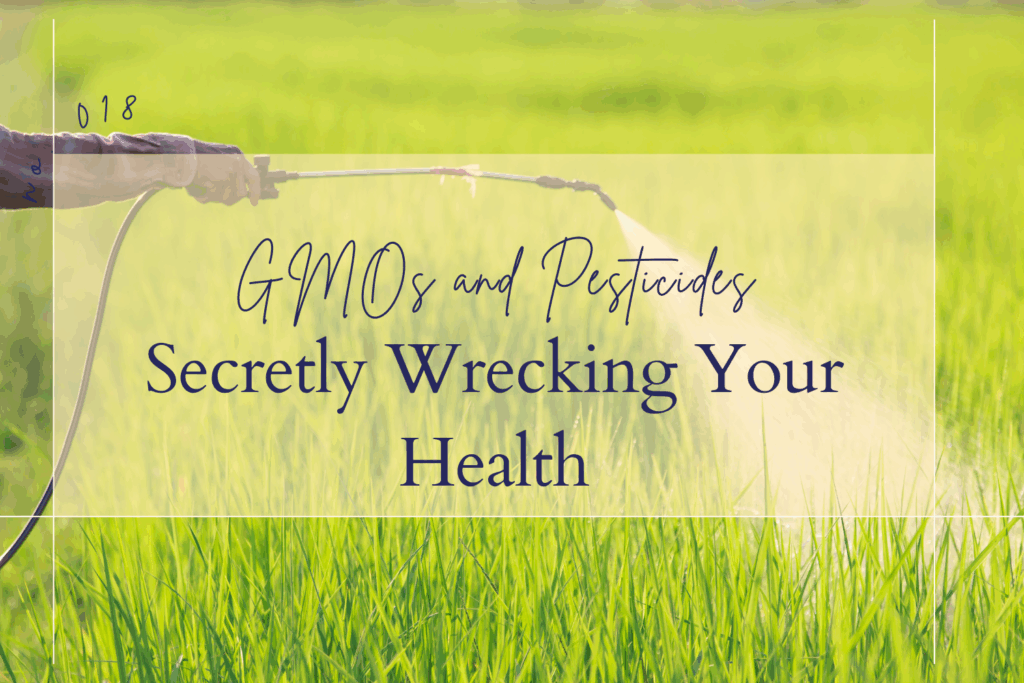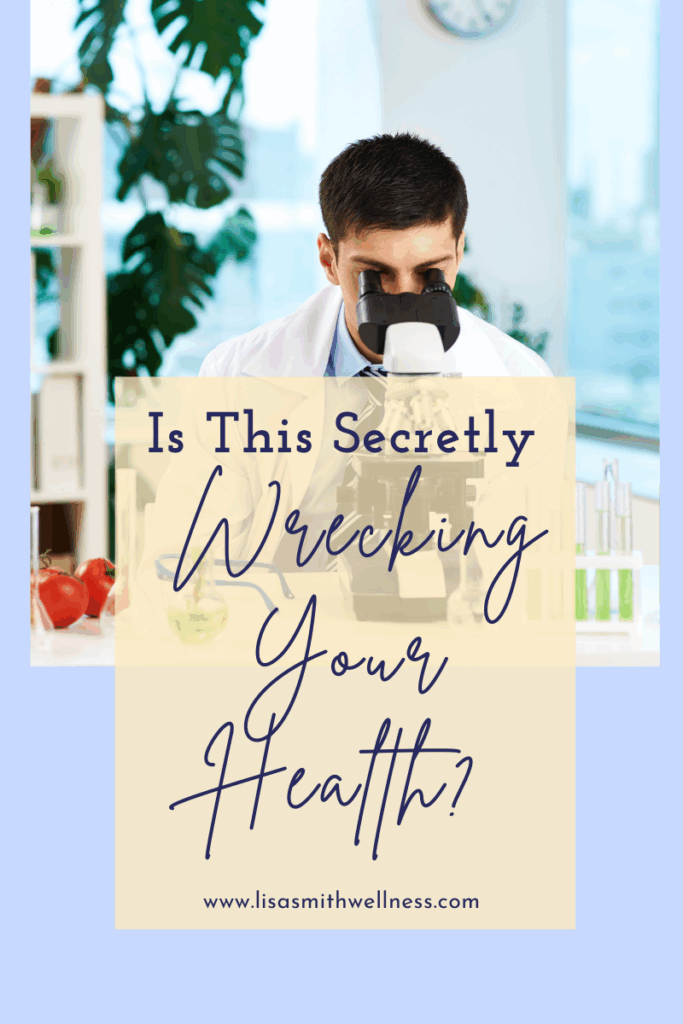Let’s be honest: reading labels at the grocery store sometimes feels like you need a PhD in food science. Between the additives, preservatives, and 27 different forms of sugar, it can be overwhelming. But one of the biggest hidden players in our food system—GMOs (genetically modified organisms) and pesticides like Roundup—deserve a closer look. Because while these were originally marketed as “modern miracles,” the truth is far messier.
Here’s what you need to know about how GMOs and pesticides impact your body, your gut, your hormones—and yes, even your skin—and what you can do to protect yourself.
This post contains affiliate links meaning I make a small commission at no extra cost to you. Thank you for supporting the work of Lisa Smith Wellness and the Pretty Well Podcast!

What Exactly Are GMOs?
“GMO” stands for genetically modified organism, which basically means a plant, crop, or food that’s been altered at the DNA level. Scientists splice genes from another plant, bacteria, or even animal into the crop so it can resist pests or survive repeated spraying with herbicides.
Sounds innovative, right? The problem is that real life rarely plays out like the shiny sales pitch.
- Roughly 90% of U.S. corn is genetically modified.
- Soy, canola, cottonseed, zucchini, papaya, and sugar beets are also frequent GMO crops.
- GMOs often go hand-in-hand with pesticide use, especially glyphosate (the active ingredient in Roundup).
So instead of eliminating pesticides, GMOs created crops that could tolerate being drenched in them. Not exactly the health-promoting solution we were promised.
GMOs + Pesticides: A Functional Medicine Perspective
Functional medicine always asks: What’s the root cause?
Here’s what the research (and your body) has been showing us about GMOs and pesticides:
1. More Chemicals, Not Less
Studies comparing U.S. agriculture to Europe (where GMOs are tightly restricted) show no real increase in crop yields from GMOs, but a huge spike in herbicide use. Translation: more chemicals in our soil, water, and food.
2. Glyphosate Everywhere
The CDC found that greater than 80% of Americans—including children—have glyphosate in their urine. Glyphosate has been linked to gut disruption, hormone imbalances, and immune dysfunction. It’s also classified as a probable carcinogen.
3. Gut Damage + Leaky Gut
Some GMO crops (like Bt corn) produce a toxin that ruptures insects’ digestive systems. Not surprisingly, scientists are worried about what this does to the human gut lining. Leaky gut, food sensitivities, and chronic inflammation are all associated with glyphosate exposure.
4. Autoimmunity + Allergies
Pesticides and GMOs may trigger immune system confusion, driving up autoimmune reactions and food allergies. Functional medicine often sees patients who notice dramatic improvements in joint pain, thyroid issues, or skin rashes when they remove GMO-heavy foods.
5. Beauty + Aging Impact
Inflammation from glyphosate exposure doesn’t just stay in your gut. Chronic low-grade inflammation shows up on your skin as dullness, acne, eczema, or premature aging.
Where GMOs Hide in Your Diet
Even if you don’t sit down with a plate of GMO corn for dinner, they sneak into your daily diet in dozens of ways:
- High-Fructose Corn Syrup: Found in sodas, baked goods, condiments, and even some “health bars.”
- Soy Protein + Soy Lecithin: Ubiquitous in protein powders, bars, processed foods, and even chocolate.
- Animal Products: If you eat conventional meat, eggs, or dairy, chances are the animals were fed GMO corn and soy.
- Processed Foods: From cereals to salad dressings, GMOs are embedded in the supply chain.
- Non-Organic Produce: Papaya, zucchini, yellow squash, and sugar beets are commonly genetically modified.
Functional Medicine Fix: How to Protect Yourself
Here’s where empowerment comes in. You don’t need to live in fear of every bite—but small, strategic shifts can dramatically reduce your exposure and support your body’s natural resilience.
1. Buy Organic Whenever Possible
Organic certification means:
- No GMOs.
- No synthetic pesticides like glyphosate.
- Better soil practices = more nutrients in your food.
Pro tip: If going fully organic isn’t realistic, start with the EWG’s Dirty Dozen and Clean 15 list to prioritize where organics matter most.
2. Look for the Non-GMO Project Verified Seal
This little butterfly logo is your friend. It guarantees the product hasn’t been made with genetically modified ingredients.
But keep in mind, that non-GMO doesn’t guarantee that a food is pesticide-free (just GMO free). For the safest choices, choose organic when possible.
3. Choose Grass-Fed + Pasture-Raised Animal Products
These animals are less likely to be fed GMO grains, and their meat, milk, and eggs tend to have higher omega-3 fatty acid levels. Have you ever noticed that pasture-raised eggs tend to have orange yolks compared to the pale yellow yolks of regular grocery store eggs?
4. Feed Your Gut
Because glyphosate disrupts the gut microbiome, you can help fortify your gut lining and bacterial diversity by eating:
- Fermented foods (sauerkraut, kimchi, kefir alternatives).
- Prebiotic-rich veggies (onions, garlic, leeks, asparagus).
- Targeted probiotic supplements.
5. Advocate + Educate
Label transparency matters. Supporting legislation that requires clear GMO and pesticide labeling is a powerful way to create ripple effects beyond your own plate.
Pin this for Later

Functional Beauty Angle: Glow From the Inside Out
Want glowing skin and strong hair? Protect your gut and reduce systemic inflammation.
- Collagen breakdown accelerates with chronic pesticide exposure.
- Antioxidant-rich foods (berries, leafy greens, colorful veggies) help neutralize free radicals from pesticides.
- Hydration + fiber support detox pathways so your liver can do its job.
Your outer radiance is always an inside job—and reducing pesticide exposure is a beauty strategy as much as it is a health one.
Key Takeaways
- GMOs aren’t living up to the hype. Instead of reducing pesticides, they’ve increased chemical exposure.
- Glyphosate is everywhere, and it’s been linked to gut, hormone, immune, and even skin health issues.
- Small changes matter. Organic, Non-GMO labels, and grass-fed proteins dramatically cut exposure.
- Gut health is beauty health. Protect your microbiome to support glowing skin and healthy aging.
Final Thoughts
The truth about GMOs and pesticides is that they’re not just an agricultural issue—they’re a functional medicine issue, a beauty issue, and a longevity issue.
But here’s the hopeful part: your body is incredibly resilient. By making informed choices—swapping conventional for organic when it matters most, feeding your gut, and staying hydrated—you can reduce your toxic load and give your body the chance to heal, thrive, and glow.
Because at the end of the day, health and beauty aren’t about perfection. They’re about awareness, consistency, and supporting your body with the tools it needs. And when you do that, you don’t just get older—you age well.
+ view comments . . .